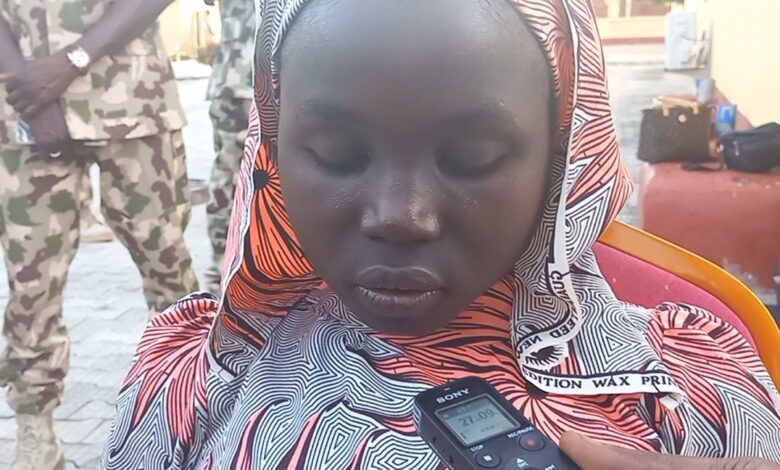Why Terrorists Kept Us After Gov’t Negotiated Release Of 82 Girls – Escaped Chibok Girl
Hauwa Joseph, one of the abducted Chibok schoolgirls who fled captivity recently, has given insights on how Boko Haram used the "marriage" status of some of the girls to block their release during negotiations.

Hauwa Joseph, one of the two abducted Chibok schoolgirls that escaped Boko Haram captivity last week, says that the forced marriage of some Chibok schoolgirls to Boko Haram insurgents was used as an excuse to block their release during negotiations between the group and government.
The Nigerian government had previously negotiated the release of 103 of their colleagues at different times. The first batch of 21 girls regained freedom in October 2016, and the second batch of 82 in May 2017.
The girls’ release, which involved the Swiss government and the International Committee of the Red Cross (ICRC), occurred after earlier failed attempts.
The deal for the remaining girls has since stalled, with reports indicating that some of the girls have died in captivity. Several girls have also escaped, including Hauwa and Mary Dauda.
In April 2018, it was also reported that the status of the remaining girls was no longer under the control of the group’s now-deceased leader, Abubakar Shekau. This was because they were ‘married’, and only their ‘husbands’ could decide their fates.
This information was corroborated by Hauwa, who escaped with a baby she gave birth to during her forced marriage with one of the Boko Haram insurgents. She stated that their marital status was why they were excluded from the list of those negotiated for release five years ago.
“When the people came to negotiate our release, the Boko Haram leaders only agreed to free those that were single at that time; they won’t allow anyone to separate them with their wives,” she said.
“I was about two years in forced marriage at that time, and the man that married me said he would not allow anyone to take his wife to Nigeria.”
Hauwa lived with her ‘husband’, a sub-commander from the Gombe state in the northeast, for seven years in Gazuwa hamlet of Sambisa forest.
Ms Joseph, now a nursing mother, said they were held back when the government negotiated her mates’ release because of their marital status.
“We were forced into marrying Boko Haram members and by their creed, they don’t let go their wives upon whom they paid the dowry,” she said.
Hauwa added that “The father of my son was among those who insisted that married girls cannot be freed except with their husband’s permission,”
Abducted in her late teens, Hauwa could not say precisely how old she was. “It’s been a long time since I thought about my age, and I forgot how old I am now,” she said.
“But I know I have been married to my late husband, I mean the father of this child for over seven years now. And he has been providing food and other needs for me till when he was killed sometime last year during a military raid on our camp in Gazuwa hamlet.
“Since his death, things became more difficult for me because no one cared for me and my child anymore.”
Hauwa said though the death of her child’s father left her in worse condition, it gave her some freedom to think about escaping from the Sambisa forest.
Hauwa and her escaped colleague, Mary, have since been reunited with their family in the Chibok local government area of Borno state.
In April 2014, over 270 schoolgirls were abducted after the terror group stormed their school dormitory in Chibok town in the southern Borno area of the Northeast.
Support Our Journalism
There are millions of ordinary people affected by conflict in Africa whose stories are missing in the mainstream media. HumAngle is determined to tell those challenging and under-reported stories, hoping that the people impacted by these conflicts will find the safety and security they deserve.
To ensure that we continue to provide public service coverage, we have a small favour to ask you. We want you to be part of our journalistic endeavour by contributing a token to us.
Your donation will further promote a robust, free, and independent media.
Donate HereStay Closer To The Stories That Matter




